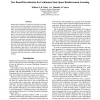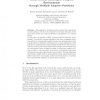651 search results - page 35 / 131 » Algorithms for Inverse Reinforcement Learning |
132
click to vote
AAAI
1998
15 years 3 months ago
1998
Reinforcement learning is an effective technique for learning action policies in discrete stochastic environments, but its efficiency can decay exponentially with the size of the ...
137
click to vote
AIIA
2007
Springer
15 years 8 months ago
2007
Springer
The application of Reinforcement Learning (RL) algorithms to learn tasks for robots is often limited by the large dimension of the state space, which may make prohibitive its appli...
118
click to vote
VLSID
2005
IEEE
15 years 8 months ago
2005
IEEE
The primary advantage of using 3D-FPGA over 2D-FPGA is that the vertical stacking of active layers reduce the Manhattan distance between the components in 3D-FPGA than when placed...
124
click to vote
ICML
1999
IEEE
16 years 3 months ago
1999
IEEE
Consider the task of exploring the Web in order to find pages of a particular kind or on a particular topic. This task arises in the construction of search engines and Web knowled...
110
click to vote
ICML
2006
IEEE
16 years 3 months ago
2006
IEEE
In the model-based policy search approach to reinforcement learning (RL), policies are found using a model (or "simulator") of the Markov decision process. However, for ...


